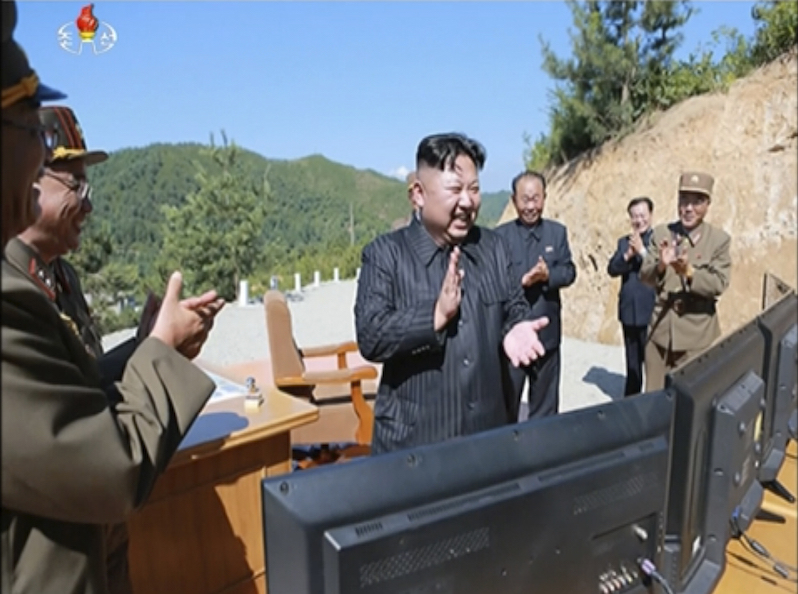
By Col. Ann Wright
Editor’s note: This article originally appeared at TruthDig! on July 18, 2017. (The text has been edited with permission from Ann Wright.) The full text is at www. truthdig.com.
Despite the rhetoric from the Trump administration about a military confrontation with North Korea, the common theme of many U.S. experts on North Korea is that the U.S. presidential administration must conduct a dialogue with North Korea—and quickly. Military confrontation is not an option, according to the experts.
And most important, the new president of South Korea, Moon Jae-in, was elected in May 2017 on a pledge to engage in talks with North Korea and pursue diplomacy to finally officially end the Korean conflict. Nearly 80% of South Koreans support a resumption of long-suspended inter-Korean dialogue, according to a survey by a presidential advisory panel showed in late June.
On June 28, six former high-level, experienced U.S. government officials from both Republican and Democratic administrations over the past 30 years sent a letter to President Trump stating that “Kim Jong Un is not irrational and highly values preserving his regime…Talking is not a reward or a concession to Pyongyang and should not be construed as signaling acceptance of a nuclear-armed North Korea. It is a necessary step to establishing communication to avoid a nuclear catastrophe. The key danger today is not that North Korea would launch a surprise nuclear attack. Instead, the primary danger is a miscalculation or mistake that could lead to war.”
They wrote: “There are no good military options, and a North Korean response to a U.S. attack would devastate South Korea and Japan. Tightening sanctions can be useful in increasing pressure on North Korea, but sanctions alone will not solve the problem. Pyongyang has shown that it can make progress on missile and nuclear technology despite its isolation. Without a diplomatic effort to stop its progress, there is little doubt that it will develop a long-range missile capable of carrying a nuclear warhead to the United States.”
Their letter ends, “Today, there is a window of opportunity to stop these programs, and it may be the last chance before North Korea acquires long-range capability…We urge you to put diplomacy at the top of the list of options on the table.”
Two weeks earlier, on June 13, former Secretary of Defense William Perry and University of Chicago Korean War historian Bruce Cumings both strongly advocated for dialogue with North Korea at the Korean Peace Network’s conference “Off Ramps to War” at the Partnerships for International Strategies in Asia, Elliott School of International Affairs, George Washington University, in Washington, D.C.
Perry asked, “Why do we have a double standard for North Korea? We accept Saudi Arabia as it is with its human rights violations, but we do not accept North Korea as it is—a nuclear power. Refusing to listen to the North Koreans about their goals and needs has meant that in the 17 years since the last relevant dialogue, the North Koreans have developed and tested nuclear weapons and intercontinental missiles.”
President George W. Bush’s naming North Korea as part of the “Axis of Evil” in January 2002 and the Obama administration’s “Strategic Patience” policy were not forms of diplomacy, but instead were “miserable policy failures,” according to Perry, who noted that the lack of a U.S. negotiating strategy has allowed North Korea to do what the United States and other major powers do not want it to do—test nuclear weapons and missiles.

Perry said that the North Korean government has three goals: staying in power, gaining international respect and improving the economy. Perry emphasized that the North Korean government will sacrifice the last two goals—gaining international respect and improving the economy—to achieve the first goal of staying in power.
Because of the lack of listening to and acknowledging North Korean objectives on what its goals are—which include signing a peace treaty to take the place of the 50-plus-year armistice, signing a nonaggression pact and reducing U.S.-South Korean military war games—Perry believes that the best outcome available to negotiators is to freeze the nuclear weapons and the ICBM programs, not their elimination.
Perry said he believes North Koreans would never use nuclear weapons as those weapons “are valuable only if they don’t use them. They know the response from the U.S. would be devastating, should North Korea explode a nuclear weapon.”
Cumings, author of The Korean War: A History, said at the symposium that the Clinton administration achieved important goals with North Korea, including “North Korea freezing its plutonium production for eight years (1994–2002) and, in October 2000, indirectly working out a deal to buy all of North Korea’s medium- and long-range missiles—and signing an agreement with North Korean General Jo Myong-rok in a meeting in the White House stating that neither country would bear ‘hostile intent’ toward the other.”
Neocon Truculence
But the George W. Bush administration—led by Vice President Dick Cheney, Defense Secretary Donald Rumsfeld and Undersecretary of State John Bolton—“actively sought to torpedo the Agreed Framework” and succeeded in pushing aside the agreements negotiated by the Clinton administration, thereby destroying the 1994 freeze and refusing to acknowledge the Clinton-Jo pledge of “no hostile intent,” particularly given that the pledge was made by allowing a North Korean general inside the White House.
With President Bush’s January 2002 State of the Union speech, in which he linked North Korea to Iran and Iraq as an “axis of evil,” the Bush administration turned its back on North Korea, abrogating the “Agreed Framework” and halting shipments of American fuel oil permanently. In response, the North Koreans withdrew from the Non-Proliferation Treaty (NPT) and restarted their plutonium-producing reactor.
Historian Cumings wrote that “the simple fact is that Pyongyang would have no nuclear weapons if Clinton’s agreements had been sustained.”
Sheldon Richman, executive editor of The Libertarian Institute and the former senior editor at the Cato Institute, wrote, “Kim shows every sign of having learned the lesson of recent U.S. regime-change policies toward Iraq and Libya, neither of which were nuclear states. Same with Syria, whose regime has been targeted by the U.S. government. The lesson is: If you want to deter a U.S. attack, get yourself some nukes.”
Robert E. Kelly, associate professor of international relations in the Department of Political Science at Pusan National University, wrote, “The best way to guarantee the North’s survival is nuclear deterrence… given Pyongyang’s goals to, 1) not change internally and 2) not be attacked externally. This is not ideal of course. Best would be a de-nuclearized North Korea. But this is highly unlikely at this point.”
*****
Colonel Ann Wright (Retired) spent 29 years in the U.S. Army and Army Reserves and 16 years as a U.S. State Department diplomat before resigning on the eve of the Iraq War in 2003. She resigned from the Department of State on March 19, 2003, in opposition to the Iraq war.
